The Ultimate Guide To Sprouted Onions
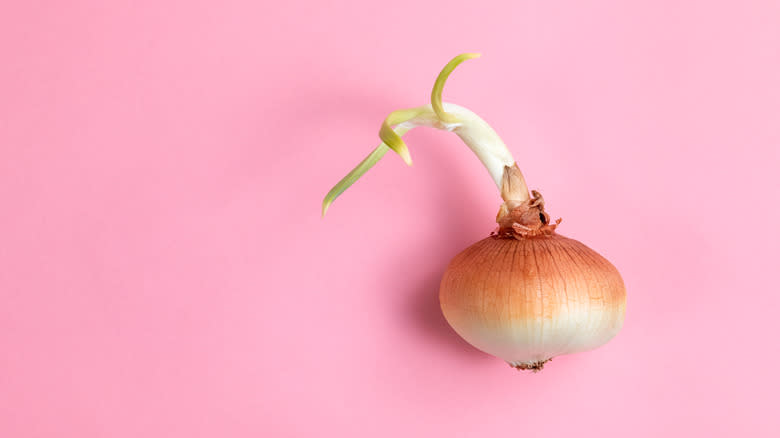
We've all done it before — you buy a bag of onions, intending to use them all up in your week's wonderful recipes, but that bag gets shoved into a corner somewhere, and you forget about it after only using a few bulbs. While rummaging through your kitchen cabinets, you find your old onions, only to see that shoots have burst out from their tops. Your heart sinks, because you don't like to waste food, and here are several old onions that could've been something great.
Don't despair! There's no need to cry over spilled milk (or in this case, nearly fossilized onions). You might think sprouted onions are something to immediately throw out, but think again. Curiously enough, there are some culinary uses for what seems like trash. After all, one man's junk is another's treasure! So stop eyeing that bag suspiciously. Instead, learn more about sprouted onions and see what you can potentially do with them.
Read more: 12 Vegetables And Fruits That Used To Look Very Different
What Is A Sprouted Onion?
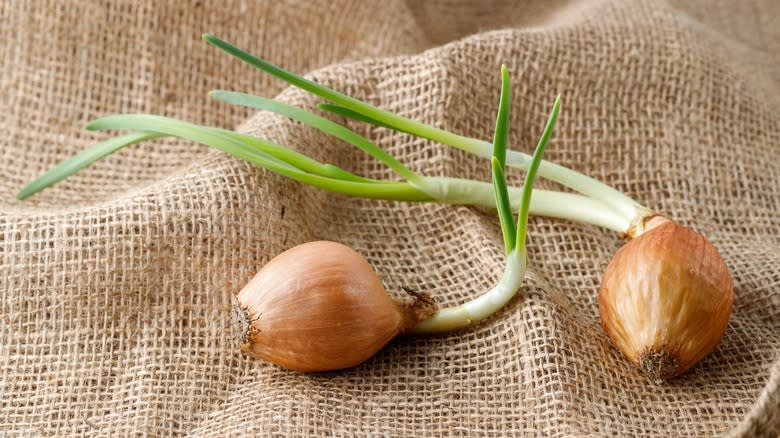
This might sound like a strange question, but if you've left onions long enough to sprout, chances are, you've forgotten about them and you might think aliens have left some weird ingredient in your pantry. Obviously, sprouted onions come from regular cooking onions (their official scientific name is Allium cepa), so your onions may be Spanish, sweet, yellow, red, white, etc. But why does this even happen in the first place?
Well, onions are bulbs, so they're not too different from tulips. When harvested, onions are at the later stages of their lifecycle, so you've got to use them up fast. If you leave them alone, they'll want to do what most living things do: Multiply or reproduce. As a last effort to have onion babies, they'll start sprouting once the onions come out of dormancy. Like many other fruits and vegetables, onions release a growth hormone called ethylene. At the end of dormancy, they'll produce an increased amount of it, which then causes the sprouts to start growing.
Is It Safe To Eat Sprouted Onions?
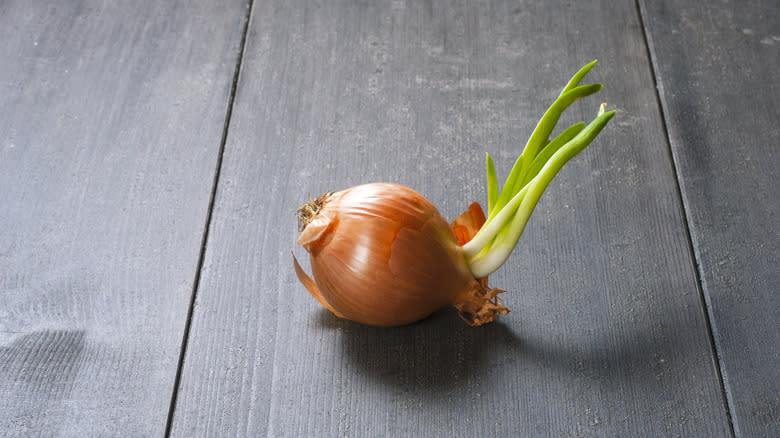
That sprouted onion may not be a pretty sight to behold, but that doesn't necessarily mean you can't still eat it. You might be wary since you've heard that you can't eat sprouted potatoes. Potatoes produce toxic compounds when they sprout though, while onions don't. This makes sprouted onions safe to eat.
Make sure to check it thoroughly before you throw a sprouted onion into any dish. First, do a visual inspection to see if there's any mold. Then, feel all around it for soft spots. If you find any squishiness, then you might have to toss it. Try stripping the bad parts and see if the inside's still good. You can cut into it to make sure it hasn't rotten from the inside out too. For extra measure, give any surviving parts of the onion a thorough rinse.
You should also smell your onions to see if there are any off odors. If an onion is leaking any juices, toss it immediately. It's always better to be safe than to be sorry, so say goodbye to your onion if it seems sketchy in any way.
Onions Vs, Sprouted Onions
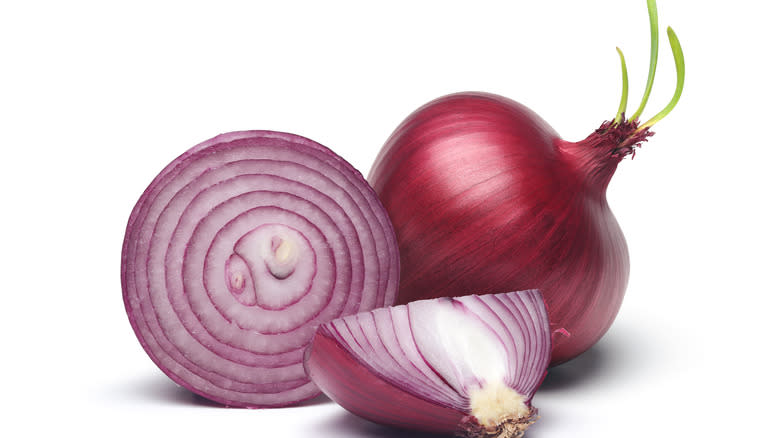
Now that you know that sprouted onions are edible, you might be wondering what exactly they taste like compared to normal onions. A sprouted onion will still have the original onion's sweet yet sharp taste, of course, but there will be notable differences since it's at the end of its lifespan.
For one, a sprouted onion will be much softer and not as crisp anymore. The sharp taste will have faded as well, and it won't be as sweet anymore. This is because a sprouted onion converts the sugars from the bulb as a form of energy to grow the sprout, making it more bitter. This dries out the bulb too, making the flesh harder, and sometimes almost leathery. You can try peeling these tougher layers off to get at the juicy ones underneath. Sometimes, trimming away the top part near the sprout helps as well. As for the sprouts, they're comparable to green onion or chives, both in looks and texture. In regards to taste, again, they're a bit bitter, but nothing that's too unpalatable.
How To Cook With A Sprouted Onion
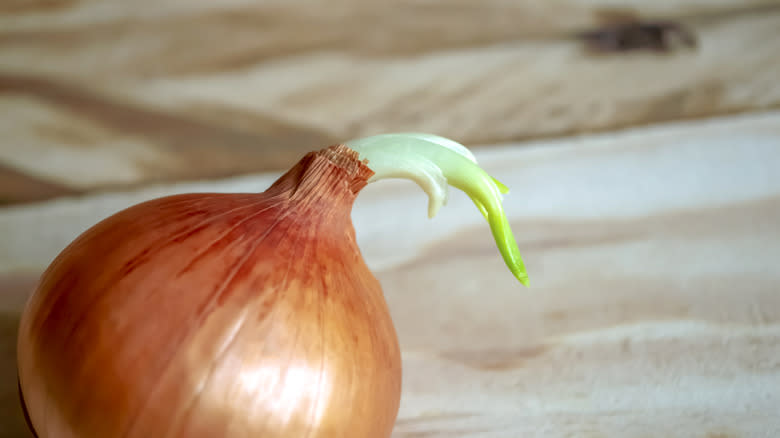
The good news is that you can use sprouted onions in any dish as you'd normally would with regular cooking onions. However, we don't recommend using them raw, as you'll really taste the bitterness (unless that's what you like). These older ingredients will taste less fresh as well, so ideally, you'd use them in recipes where onions aren't a star, but rather, supporting acts for the main ingredients.
One way people like to use onions is to caramelize them, since these can be added to a wide variety of meals to highlight things like proteins. If you're a fan of easy crockpot recipes, then try making our slow-cooker French onion soup recipe. You'll caramelize the onions directly in the slow cooker for at least 6 hours, then pour the broth in to cook for up to 8 hours more. The result is a delicious soup that'll pair nicely with crusty bread. You can also make pickled onions if you're a fan of sour foods. Our guide will show you how long to pickle onions to get them tasting their best. Seafood lovers will be pleased to know that combining something like pan-seared flounder with garlic and sprouted onion will work too.
Nutritional Information About A Sprouted Onion
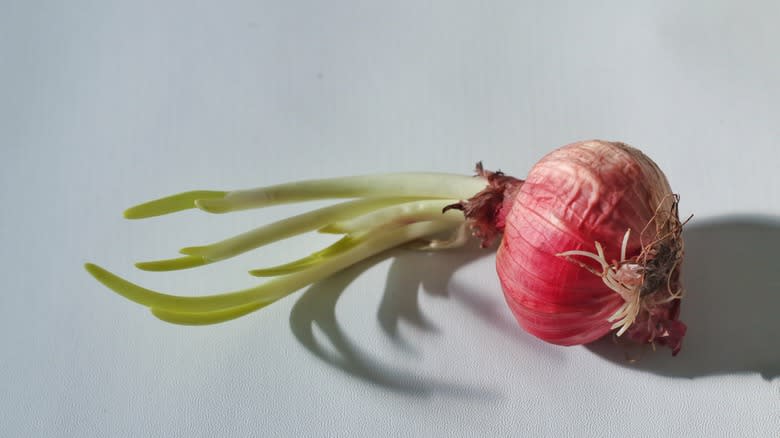
The nutritional content of sprouted onions shouldn't differ too much from a regular cooking onion. Of course, the aging process may deplete the onion of some of its nutrients, but it's a negligible difference, and in some cases, you might even get more of some vitamins and minerals.
In general, onions are full of antioxidants and have anti-inflammatory properties. These two elements can help decrease symptoms from various health issues. In addition, onions are low in calories and a good source of fiber, making them excellent for those who want to get in shape. On top of that, you'll get plenty of vitamins B6 and C, folate, and potassium, so don't be shy about adding onions to your dishes, even if the recipes don't call for them. In fact, a study published in the FUW Trends in Science & Technology Journal found that sprouted onions had an increased amount of vitamin C and antioxidants.
How To Store A Sprouted Onion
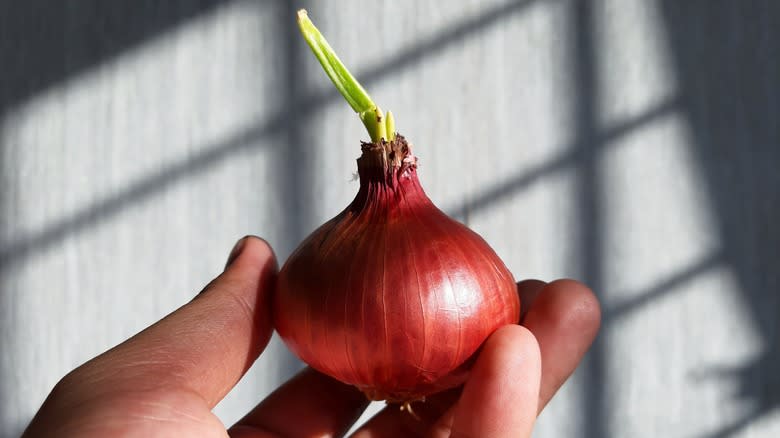
If your onions are at the point of sprouting, then you won't want to store them any longer. Their condition is only going to deteriorate, meaning the longer you store them, the more bitter and leathery they'll become. Plus, each day that ticks by will bring your ingredients closer to molding and rotting. When this happens, you can't salvage any of the onions, and you'll have to throw them out. The best thing to do is to use your sprouted onions up as quickly as possible or, if you don't like the taste, just toss them. You should definitely put them in the trash if you spot any early signs of rot or if the onions seem to be drying up fast.
Can't use your onions right away because you've got your meals all planned out already or you're leaving on vacation? One simple way to deal with them is to, again, trash them. However, if you want to store them for whatever reason, your best bet is a cool and dark cabinet. These conditions discourage plant growth, so you might be able to squeeze a few more days out of these sprouted onions.
How To Plant A Sprouted Onion
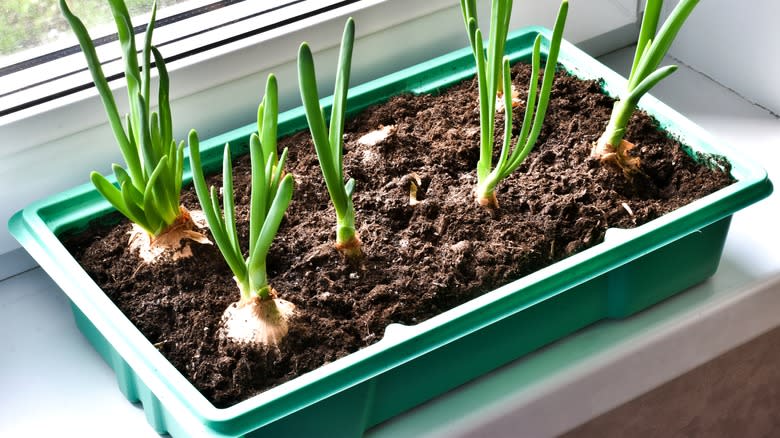
If your sprouted onions are too far gone and you can't cook with them, don't throw them away just yet. Instead, get a small planter and fill it with potting compost. Nestle your onions into the soil with the root side down, and leave the top inch or two uncovered. Put the planter on your windowsill, or outside if it's warm enough, and ensure it's always well watered. In a little time, not only will you get fresh sprouts, but even new onions to eat.
If you want to do a cool experiment and force your onions to sprout, then get small glasses or ramekins and partially fill them with water. Put your onions in (without peeling them), root side down, with the water reaching slightly above the roots. You can also do this in a shallow dish with onion ends you've cut off, as long as the roots are still intact. Whichever method you choose, make sure to change out the water regularly to prevent rot and a bad odor. Another way you can force your onions to sprout is to just leave them alone somewhere dry. They'll eventually grow their shoots!
How To Prevent Onions From Sprouting

It's nice to know that sprouted onions aren't automatically inedible, and that you can still make some tasty recipes with them. Still, it's ideal if you can prevent the sprouting from happening in the first place, so you can cook with the onions' original flavors and textures. How do you lower the chances of onions sprouting though?
First, consider what plants need to grow: Water and sunlight. With that information, you can deduce that to stop your onions from advancing in their lifecycle, you'll need the exact opposite. This means that you should keep them in cool, dry, and dark places. You can technically keep them in the fridge, but it might get smelly in there. In addition, onions tend to get soggy and soft faster when refrigerated, so you're better off keeping them at room temperature.
You should also keep your onions far away from other alliums and potatoes. These other ingredients release ethylene too, so they'll encourage each other to sprout. And because potatoes release moisture as they age, they'll make onions go soft as well (and vice versa).
Read the original article on Daily Meal

